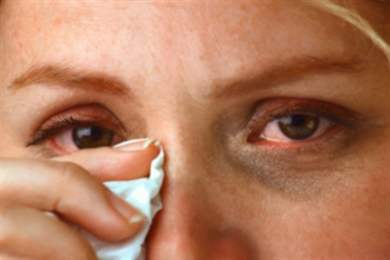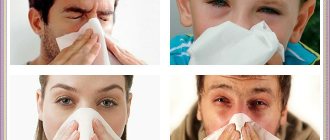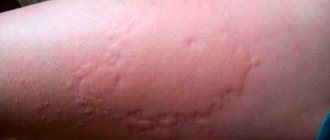In recent years, allergies have increasingly taken a leading position in the structure of morbidity. According to various sources, now in the world from 25 to 40% of the population suffers from one form or another of allergies, and more and more often allergic reactions occur in severe form.
The causes of allergies are still not fully understood by doctors, but it is clear that environmental factors play a huge role in the development of the disease: water and air pollution, poor nutrition, especially the consumption of foods with a huge amount of various chemical additives, bad habits, primarily smoking . Speaking about the causes of this terrible disease, it is also important to understand whether allergies are inherited?
Predisposition to allergic reactions
Allergies are not hereditary diseases, but only a predisposition to allergies is passed on from generation to generation, and it is polyvalent. This means that if someone in the family tree suffered from plant pollen, this does not mean that exactly the same allergen will be identified in a relative.
This occurs because the genes responsible for transmitting the ability to get the disease influence 3 factors:
- synthesis of immunoglobulin E molecules;
- the basis of all types of allergies is cellular association;
- the mechanism of biochemical and pathophysiological reactions of a non-immune type.
As a result of studies of allergies in twins, it was revealed that most had a reaction to the same allergen. But a third of the subjects were allergic to various irritants. This confirms that genes that can lead to allergies are passed on from parents or from relatives of more distant generations, and not the disease itself.
The reasons why some people with a hereditary predisposition do not develop allergies, while others do the opposite, are many factors. The most important thing is a person’s lifestyle and his environment. It is very important to lead a healthy lifestyle, eat right, and live in environmentally friendly places. By observing all this, you can avoid illness. But modern life dictates such conditions that it is very difficult to follow these recommendations.
Another factor is the overall health of the person. If he has a history of chronic diseases or previous operations, then they can trigger the development of allergies. Taking medications in large quantities can also contribute to the disease.
The third factor is nutrition in infancy and maternal diet during pregnancy. Mother's milk is a good preventive measure, since it transfers protective cells to the baby and also creates a properly functioning microflora.
Despite the fact that the tendency to allergies is inherited, it is possible to reduce the likelihood of its occurrence to a minimum.
To do this, you must follow a number of rules:
- Future pregnancy must be approached responsibly. Mom and dad must get rid of bad habits long before conception. A correct lifestyle is necessary.
- If one or both parents work in hazardous conditions, we recommend changing jobs. This must be done six months before the planned conception.
- If living conditions are such that you have to breathe polluted air (the room’s windows overlook a busy road), then try to do so in order to be less exposed to this influence. Take more walks in forested areas, get out into nature whenever possible, and spend more time outside the city.
- Use less household chemicals. Limit use of cosmetics and perfumes.
- You should not start renovations in your apartment either during the period of conception, or during pregnancy, or in the first months of the child’s life.
- Eliminate the influence of tobacco smoke. Passive smoking is just as dangerous as active smoking. Do not be in places where people smoke.
- Try to use a hypoallergenic diet in your diet. Remove all allergic foods from the diet. There should be no preservatives, dyes or similar substances in food.
- If a woman is susceptible to allergies, then during pregnancy and when feeding the baby with breast milk, one should try to avoid exacerbations of the disease.
The most important thing is to constantly strengthen the immune system, avoid negative environmental influences, and lead a healthy lifestyle. In this case, you can avoid passing on a hereditary predisposition to allergies to your child.
Prevention
Are father's or mother's allergies passed on to the child? –
yes, but in order to reduce the risks, you should follow some rules of prevention:
- At the time of planning pregnancy and during it, it is worth completely eliminating contact with allergens.
- It is important to establish nutrition so that the baby receives all the necessary components for the formation of a stronger immune system.
- Both parents should completely give up alcohol and smoking.
- Try to walk a lot in the fresh air, this is especially true for the expectant mother.
- Incorporate positive emotions into your life.
By following these rules of prevention, you can protect your unborn baby and not expose him to an allergen. Only parents can change the situation, hoping to be among those 75% in which children do not get allergies at the genetic level.
According to WHO (World Health Organization) research, more than 40% of the world's population suffers from allergic reactions of various types, that is, almost every second person. Allergies are often inherited. This phenomenon is called atopy (from the Greek atopia - strangeness).
How allergies develop
Most often, the disease first appears in a person in childhood. But sometimes it can appear much later. Every year the number of sick people increases, most of which react to food products, pollen, and cosmetics.
The disease occurs in the following way: when harmful microbes enter the human body, defense systems are launched. They recognize foreign microorganisms and signal special blood cells to neutralize them.
In patients with allergies, the functioning of this mechanism is impaired.
The immune system of an allergy sufferer sees the enemy not only in pathogenic flora, but also in completely painless substances (allergens) contained in the air, food, and water.
As soon as such an allergen first enters the body of a person prone to allergies, these blood cells begin to work against it. The antibodies produced remain in small quantities in the body forever, in case similar substances enter the body again someday. And in this case, the reaction to the allergen already begins.
The increase in diseases is primarily due to poor ecology. But frequent use of antibiotics also plays a significant role. The immune system, designed to fight bacteria, does not carry out its direct activity (medicines do this), but begins to fight pseudo-threats, for example, plant pollen.
Allergies most often develop in young children. Newly born babies begin to react to cow protein or to synthetic detergents that are used to wash baby clothes.
When a child turns 2-3 years old, the respiratory tract is often affected by allergies. Very often it is confused with colds, and treatment with antibiotics begins. Parents whose child often gets colds are advised to check for allergens.
The symptoms of the disease can be eliminated, but this does not mean that a complete cure has occurred. Predisposition to allergies remains for life. But proper treatment started in a timely manner leads to the patient forgetting about the manifestation of the disease for a long time.
An allergy is a peculiar reaction of the body to the penetration of foreign bodies into it. The occurrence of this reaction is influenced by the state of the immune system. If it is weakened, the risk of allergies increases. Are allergies contagious like viral and infectious diseases? Let's talk about this in the article.
Manifestations of allergies
An allergy to cow's milk in an infant manifests itself in the form of loose stools. The situation arises against the background of disruption of the digestive system.
When breastfeeding, this pathology manifests itself in the form of the following symptoms:
- A detailed examination of stool can reveal milk that has not been digested. In terms of external characteristics, it is similar to cottage cheese.
- The baby begins to burp more often than usual.
- If the disease has already reached a severe stage, then blood impurities can be found in the stool.
- Allergies always cause abdominal pain, so newborns begin to actively cry and show their whims.
- When palpated, slight bloating may be detected.
- Disruption of sleep and rest patterns and almost complete loss of appetite.
- Increase in body temperature.
- Colic in the intestines, which occurs against the background of accelerated peristalsis.
In an infant, an allergy to cow's milk can easily be confused with ordinary colic. At the first stage of development, characteristic rashes appear on the skin. If treatment is not started on time, the consequences will be serious. A diagnosis will help you avoid chronic diseases in the future. Parents should visit their pediatrician's office at the first sign of an allergy.
If the allergy continues for a long time, then a deficiency of certain enzymes develops in the body. Lactose and gluten negatively affect the overall functioning of the pancreas. The body also records an insufficient amount of hormones that are involved in the digestion process.

For diagnosis, it is necessary to submit a urine sample for analysis.
In a newborn, against this background, the number of beneficial intestinal bacteria decreases. Pathogenic microorganisms begin to actively multiply. Due to this, the volume of harmful bacilli and enterococci, which most often cause dysbacteriosis, increases.
Individual intolerance to cow's milk protein manifests itself in the form of profuse skin rashes. It reflects the overall well-being and health of the baby. Against the background of allergies, eczema, atopic dermatitis, swelling and urticaria develop.
Parents should first of all pay attention to the baby’s health when breast milk appears. Most often, pathology is recorded in infants who are on artificial feeding. The disease leads to the formation of edematous spots on the skin, which after a certain period become covered with a thick crust. The symptom appears on the head and ears.
Eczema is another negative consequence of cow's milk intolerance. Small blisters appear on the skin, which after a certain time become erosions. They are also characterized by leakage of liquid. The wound will heal on its own and crust over. This disease is most often diagnosed in children under five months of age.
If atopic dermatitis becomes chronic, plaques form on the back of the elbow. The baby experiences discomfort from itching, and clear liquid periodically leaks from the wound.
Quincke's edema is a serious disease that has a number of dangerous consequences. It is characterized by swelling of the larynx and lungs. This symptom always appears in the presence of individual intolerance to cow's milk. In this case, the person experiences severe itching. To eliminate symptoms, you must immediately go to the hospital. Otherwise, the risk of death from asphyxia increases.
If an allergic reaction occurs on the baby's body, hives may also occur. The skin becomes covered with small blisters that are red and very itchy. The symptom is similar in its characteristics to a burn from urticaria, which is why it is called that in medical practice.
How allergies occur
Let's look at the mechanism of allergies:

The last stage (immune reaction) can occur with all the symptoms, or, for example, only accompanied by cold symptoms. This is a case of an allergic reaction to plant pollen. A man suffers from a runny nose and headaches. Your eyes become watery and your overall health deteriorates significantly. But there may not be any allergic rashes.

Are allergies transmitted from person to person?
Intolerance is quite rightly called individual: it can be caused by the launch of complex mechanisms characterized by such a property as specificity - that is, selectivity in relation to potential antigens. Special forms of immunoglobulins (antibodies) or T-lymphocytes sensitized (sensitive) to a certain substance are responsible for its presence.
Thus, it is impossible to become infected with allergies.
And if all family members almost simultaneously began to sneeze and cough, their eyes are watering, and their nose is running, you should think about:

At the same time, modern researchers admit that there is a new, very rare way of transmitting allergies - through blood transfusion. The basis for this was the example of a boy who, after a blood transfusion, suddenly developed reactions to food. The child did not experience any symptoms of sensitivity prior to the procedure.
However, this is an isolated episode, and there is no reliable data to speak about a similar mechanism for the spread of allergic diseases; Today, scientists have more questions than answers regarding the reasons for the development of intolerance in this case.
Although experts have found that in some cases allergies are inherited, the occurrence of the disease can be prevented. The genes responsible for predisposition to it are active only in conditions of interaction with risk factors, among which are the following:
- unfavorable course of pregnancy and childbirth;
- massive drug therapy;
- infections (including helminthiases);
- dysbiosis of intestinal microflora;
- chronic diseases of the digestive system.
Preventive measures are based on minimizing contact with triggers that increase the likelihood of allergies. Not all of them can be fully influenced, but it is worth paying attention to:
- Timely treatment of diseases.
- Planning pregnancy.
- Rational nutrition.
It is very important to use medications with caution - especially antibiotics.
They often cause allergies, and not only because the body begins to react to the components of the product. Improper use of antimicrobial drugs leads to an imbalance of intestinal microflora, adverse effects on the liver and kidneys - and this, in turn, increases the risk of developing sensitivity. And if a person without a burdened medical history does not feel the consequences, people with a genetic predisposition may encounter vivid manifestations of the pathology.
The source of trouble in all these cases is the same - allergies, one of the most insidious and most mysterious diseases, occupying one of the first places in the number of the most diverse misconceptions. Judge for yourself.
Hereditary predisposition
There is a myth that a child can get allergies from one of the parents. This is a slightly incorrect statement. An allergy is an individual reaction of the body,
which is not transmitted in any way. But a mother, not following the rules of nutrition during pregnancy, can oversaturate her body with some substance, which in the future can affect the appearance of allergic reactions in her child.
Also, if both parents are allergic, then in 70% of cases their children will also suffer from allergic reactions. This is not infection, but rather the transfer of predisposition.
How does the transfer of predisposition occur?
It is believed that the main “culprit” of transmission of the disease is the fifth X chromosome. It contains approximately 6% of the cell's total DNA material. It is also responsible for regulating the synthesis of substances in the body, in particular, antibodies that affect the occurrence or blocking of allergic reactions. If this synthesis is disrupted in the parents, the information is passed on to the unborn child.
The permeability of the histohematic barrier also increases. As a result, irritants easily enter the human blood and tissues.
Urticaria, dermatitis
Skin manifestations of allergic reactions can sometimes look scary. The rashes that cover the body strike fear into those around them. “What if I get infected?” is a question that torments many.

External allergy symptoms are not contagious
. But, for example, chickenpox is a viral disease, some of whose symptoms are similar to signs of allergies, and infects others. But chickenpox is caused by the herpes virus type 3, and it can easily be spread to other people. Then several people will suffer from itchy rashes and other symptoms
And urticaria will not spread to others in any way: neither through airborne droplets, nor through sexual contact, nor through contact.

Infectious allergies - contagious or not
This type of allergy is also not contagious.
.
But it is very important to know that infectious allergies can accompany diseases such as:

This list includes quite dangerous diseases that are easy to contract. Then the occurrence of infectious allergies cannot be avoided.

The answer to the main question - can you get infected or not?
Are allergies transmitted from person to person? No!
A predisposition may be transmitted, but not the disease itself. If there is a person next to you who is allergic to casein or cold, this does not mean that you will suffer tomorrow.

If people have the same allergic reactions that occurred around the same time, this does not mean that someone infected someone else. This phenomenon only means that two different organisms have the same effect on the invasion of provoking substances into them.

Allergies cannot be contracted from either people or animals. For prevention, it is necessary to lead a healthy lifestyle, adhere to proper nutrition and strengthen the immune system in every possible way. Then the occurrence of an allergic reaction will be minimized.
In recent years, allergies have increasingly taken a leading position in the structure of morbidity. According to various sources, now in the world from 25 to 40% of the population suffers from one form or another of allergies, and more and more often allergic reactions occur in severe form.
The causes of allergies are still not fully understood by doctors, but it is clear that environmental factors play a huge role in the development of the disease: water and air pollution, poor nutrition, especially the consumption of foods with a huge amount of various chemical additives, bad habits, primarily smoking . Speaking about the causes of this terrible disease, it is also important to understand whether allergies are inherited?
Features of milk allergy in infants
Any individual intolerance negatively affects the functioning of the respiratory system. If an allergy to cow's milk protein occurs, the child begins to sneeze actively and develops snot from the nose. The baby is worried about swelling, so he sleeps poorly, is constantly capricious and cries. Some parents notice obvious wheezing in their children's breathing. In this case, you must immediately contact the hospital for help. Otherwise, the risk of death increases.
As a result of allergies, bronchial asthma can develop. The reason lies in the regular intake of cow's milk into the mother's body.
Allergies can also manifest as atypical symptoms. In this case, pronounced swelling can be observed in the baby’s knees and joints. They can also get sick, so the child becomes moody and irritable. Individual intolerance can lead to negative changes in blood pressure.
When the disease progresses to a severe form, the constant presence of a rash can also be recorded. On the baby’s skin you can also see a blood network, which is called vasculitis. The symptom appears just a few hours after the allergen enters the baby’s body. Some patients also complain of nosebleeds or problems with the genitourinary system. In this case, urine excretion occurs rarely or, conversely, too often.
When taking tests, the doctor pays attention to the number of red blood cells and protein in the urine. Only in rare cases, individual intolerance to cow's milk manifests itself in the form of an increase in body temperature.

Only medications prescribed by a doctor should be used for treatment.
The role of hereditary factors in the development of allergies
It has now been reliably established that it is not the allergy itself that is inherited, but the predisposition to its occurrence. According to medical statistics, the probability of an allergy in a child is about 30% if one of the parents suffers from allergies, and about 60-70% if both parents suffer from allergies. If none of the parents or grandparents had an allergy, then in children this disease occurs in approximately 10% of cases.
At the same time, a tendency to a certain form of allergy and sensitivity to specific allergens are not inherited. That is, if, for example, a mother suffers from allergic rhinitis caused by the pollen of a particular plant, then the child’s allergy will not necessarily manifest itself in exactly the same form. It is quite possible that he will calmly tolerate the pollen of this plant, but have a strong skin reaction to some food allergen.
To understand why this happens, we need to remember the mechanism of allergy development. Allergic reactions arise due to increased permeability of histohematic barriers, due to which allergens penetrate into the patient’s blood and tissues much more easily, and high reactivity of the immune system, which leads to inadequate production of antibodies. It is precisely these factors that determine the predisposition to allergies that can be inherited, and what exactly, which allergen, will serve as a trigger for the process, and in what form the allergy will occur, and whether it will appear at all, depends on the combination, one might say random, many factors. Which, however, in most cases we can completely control.
Allergy >> Heredity
Scientists have found that allergic diseases are not hereditary, in which the gene that causes the painful condition is passed directly from parents to offspring. However, the possibility of inheriting a predisposition to developing allergies
exists, and doctors and patients have to reckon with this.
Of course, we are not able to influence the conditions of existence years before a person was born, but we not only can take them into account, but we are also obliged; In addition, it is possible to trace the possibility of an allergenic influence of certain living conditions of a sick person in the past. Let’s assume that our patient Vera’s father (or mother, or even both parents) suffers from some allergic disease. Therefore, Vera cannot be considered protected from allergy diseases
in the future, although this is not necessary. It is also necessary to take into account the age at which Vera’s parents developed allergic diseases (allergies are less common in old age).
Sometimes it happens that the patient’s parents did not have allergies
, but in a number of previous generations, both on the father’s and mother’s sides there were allergic reactions.
This can explain the appearance of allergic diseases in grandchildren (the so-called genetic predisposition to the disease). Does this mean that with such heredity a person must develop allergies
? Of course not. It also depends on living conditions, diet and many other factors. But at the same time, such a person is more likely to develop the disease, and therefore he needs to take preventive measures more persistently than other people.
Let's return to Vera. Let's assume that her father suffers from bronchial asthma, and her mother suffers from food allergies. Does this mean that Vera will inherit both bronchial asthma and food allergies from them? Not at all. Specific allergic diseases are not inherited at all; only the body’s ability to react in principle to contact with allergens is inherited. These allergens can be any other substances completely different from those that caused the allergy
both dad and mom. And the disease may be different, say, allergic rhinitis, conjunctivitis, eczema.
To illustrate this point, let us follow the development of the disease in each family member. Mom, for example, is allergic to milk and dairy products, dad has bronchial asthma, which manifests itself during the flowering period of trees (for example, birch or alder), their son develops an allergic skin rash when he puts on a woolen sweater, and their daughter is healthy . All these different manifestations of allergies
indicate that it is not the disease that is inherited, but the body’s ability to react with the allergen.
Is everyone at risk of allergies?
Scientists are increasingly inclined to believe that disease is the result of the influence of a whole complex of factors on the body, but the state of the body’s immune system is often decisive. And allergic diseases are no exception in this regard.
“Every disease has its own organ. And each organ has its own disease,” said the famous pathologist Rudolf Virchow. If we adhere to this formulation, although in general it is difficult to agree with it, then we can say that a person has a similar organ that “turns on” the allergic process, giving rise to allergic disease and allergies in general
. Such an organ, or rather an organ system, is primarily the thymus gland (thymus), spleen, lungs, and lymphoid apparatus.
And so it turns out that the thymus controls primarily defense (“immunity” translated from Latin as protection). The term “immunity” came to medicine from legal sciences. In ancient Rome they said “immunitas” when it was necessary to designate a person exempt from taxes (taxes).
In medicine, since the time of I.I. Mechnikov, immunity began to be called the state of the human body as if “indifferent”, “insensitive”, not exposed to one or another infectious disease. Allergy is a condition diametrically opposed to the state of immunity. With allergies, a person has a sharply increased sensitivity. Academician of the USSR Academy of Medical Sciences Rem Viktorovich Petrov even suggests talking about hypersensitivity to certain agents, including infectious ones. That is why it is legitimate to talk about an infectious form of bronchial asthma.
Allergy in humans
may occur to one or many groups of allergens (pollen, food, dust).
The multiplicity of allergic reactions is also explained by the hereditary-constitutional predisposition of some people to allergies
, that is, the presence of a so-called allergic constitution or allergic diathesis.
Allergic diathesis is caused, firstly, by a sharp increase in the permeability of histohematic barriers and blood capillaries, due to which allergens easily penetrate through the mucous membranes of the respiratory, digestive organs, skin and other routes into the patient’s blood and tissues.
Secondly, with allergic diathesis
there is a high reactivity of the apparatus that produces antibodies, that is, the patient’s “immunologically competent” cells are capable of producing specific antibodies against various allergens in large quantities. Antibodies, or immunoglobulins, have now been studied in detail. Depending on their biological, physicochemical properties, five classes of immunoglobulins are distinguished: A, G, M, E, D.
Thirdly, allergic diathesis is characterized by the fact that proteins in the patient’s blood and tissues easily combine with various chemical substances (medicines, antibiotics) to form complex compounds in the body that have antigenic properties.
All of these features, taken together, create a predisposition in a patient with allergic diathesis to various allergies and reactions (urticaria, allergic rhinitis), often combined in the same patient.
It is easier for a doctor who has identified the individual characteristics of the constitution, which are primarily identified in childhood, to prescribe an appropriate regimen, and, if necessary, prescribe an appropriate course of treatment.
Every human body is unique. This has been clearly proven by doctors, in particular immunologists, allergists, etc.
Post Views: 518
Allergies occupy a leading position among diseases that cause discomfort and cause sharp reactions in the body. Are allergies inherited? If one of the parents has a tendency towards severe allergic manifestations to a particular irritant, then the probability that it will manifest itself in the child is 25%. If both parents have allergies, fidelity increases to 50%.
Heredity plays an important role in the formation of immunoglobulin E-dependent allergic diseases. If the parents in a family are predisposed to a sharp reaction to an allergen, there is a possibility that the child will inherit this function.
The nature of allergic manifestations differs in all cases. If parents are allergic to dairy products or household items, then the baby will observe a reaction to seasonal flowering, dust, and more. This suggests that it is not the disease itself that is inherited, but the body’s ability to react negatively and sharply to any type of irritant.
It is impossible to influence the health of a child before his birth, but you can change the life of the expectant mother carrying the baby. If a woman is allergic to vegetables, flowers, or a certain environment, during pregnancy she should limit her exposure to these allergens as much as possible. The child does not necessarily have to develop the ability to react inappropriately to stimuli, but as a preventive measure and precaution, you still need to use this advice.
Whether allergies are passed from parent to child is controversial. The mother’s way of life during pregnancy and the severity of allergic manifestations in parents depend on this. There are cases when parents with allergies give birth to children whose bodies react quite normally to any type of irritant.
What to do to prevent allergies from being inherited by a child?
As we see, we practically cannot influence the tendency to allergies from being passed on to the child. But it is quite possible for mom and dad to dramatically increase the likelihood that even if there is a hereditary predisposition to developing allergies, the child will not suffer from the manifestations of this disease. What needs to be done for this?
First, carefully prepare for pregnancy and conception.
- Parents should lead a healthy lifestyle and get rid of bad habits, if present. It is very important for both parents to quit smoking at least six months before the expected conception.
- If possible, avoid exposure to industrial and household hazards, again, for both parents:
- If you work at a chemical plant or other hazardous industry, try, if not change jobs (it is clear that this advice is much easier to give than to implement), then at least move to some less dangerous area. Moreover, again, at least six months before the planned moment of conception.
- If your apartment windows face a busy highway or factory chimneys, do everything possible to breathe as little polluted air as possible. If it is not possible to change your apartment, then try to spend as much time as possible at your dacha, in your grandmother’s village, or at least walk in parks and squares more often.
- Use household chemicals, cosmetics and perfumes as little as possible. Although all these products have all sorts of certificates and other full set of documents proclaiming their absolute safety, in reality not everything is so rosy...
- Under no circumstances should you start renovating your apartment during pregnancy, preparation for it, or in the first months of the child’s life.
The period of pregnancy and breastfeeding is very important. It has been proven that it is during pregnancy that the child becomes allergic very often. To avoid this, you need to:
- avoid industrial and household hazards and bad habits even more carefully (see specific tips just above);
- Eliminate exposure of mother to tobacco smoke. Not only active but also passive smoking is extremely harmful, not only when dad smokes right in the apartment, but also when smoke enters the apartment, for example, from neighbors smoking on the stairwell or on the balcony;
- eat right, adhering to a hypoallergenic diet or at least excluding from the diet the most allergenic foods and, especially, foods stuffed with all sorts of chemicals and food additives (dyes, preservatives, flavors...);
- If your mother suffers from allergies, do your best to avoid exacerbation of the disease and the occurrence of allergic reactions during pregnancy and breastfeeding.
Strengthen your immune system, lead a healthy lifestyle, stay away from hazardous industries, highways and smokers, and you will dramatically increase the chances that your child will be born healthy and will not suffer from allergies and many other diseases all his life!
The source of trouble in all these cases is the same - allergies, one of the most insidious and most mysterious diseases, occupying one of the first places in the number of the most diverse misconceptions. Judge for yourself.
Preventing inherited allergies
Modern scientific knowledge proves and accepts the fact that genetic transmission of allergies is impossible. However, preventing predisposition is only possible if you follow the doctor’s recommendations and make an informed decision about having a child. Some believe that a hereditary predisposition can develop even from close relatives.
To prevent hereditary predisposition, the following measures must be taken:
- approach pregnancy responsibly, rationally, carefully;
- six months before conceiving a baby, it is necessary for both parents to work in favorable conditions. It is forbidden to work in hazardous industries, as this can harm the baby;
- the ecological and natural environment of the area where future parents live should have a favorable atmosphere. When living in a metropolis, there is the influence of unsafe manifestations of the ecological system, there is a lack of clean air, etc. To give birth to a healthy baby, it is necessary to reduce risks, environmentally affected areas of the area, travel more often to nature, to forested areas, etc.;
- avoid chemical and household elements, passive smoking, stop using chemical and decorative cosmetic products;
- do not carry out renovation or construction work six months before the birth of the baby and up to a year after birth;
- Follow the diet plan developed by your doctor.
Don’t worry too much, it’s important to follow the recommendations and strengthen your immune system
.

In recent years, allergies have increasingly taken a leading position in the structure of morbidity. According to various sources, now in the world from 25 to 40% of the population suffers from one form or another of allergies, and more and more often allergic reactions occur in severe form.
The causes of allergies are still not fully understood by doctors, but it is clear that environmental factors play a huge role in the development of the disease: water and air pollution, poor nutrition, especially the consumption of foods with a huge amount of various chemical additives, bad habits, primarily smoking . Speaking about the causes of this terrible disease, it is also important to understand whether allergies are inherited?
Misconception No. 3. Allergies most often worsen in the spring, when everything around is in bloom.
If we are talking about hay fever (pollen allergy), then many allergy sufferers continue to sneeze and cough in the summer, when after “wooden” hay fever comes “herbal” hay fever. In June-July, herbal aggressors are added to the tree ones: timothy, fescue, rye, oats, wheat, common in rural areas, as well as weeds well known to every city dweller (ragweed, nettle, quinoa, dandelion, wormwood), which continue to spoil the lives of allergy sufferers right up to the end of September. And allergy to dust is a year-round phenomenon, independent of the weather and time of year.
Misconception No. 5. If a person did not have a pollen allergy as a child, then it will not manifest itself.
Alas, hay fever is a hereditary disease. Even if throughout your childhood you calmly frolicked among dandelions and enjoyed the aroma of blooming jasmine, by the age of 25, an allergy to pollen will definitely make itself known. Those who were born during the flowering period of cereal grasses or angiosperms were most unlucky.
Scientists have discovered that if the first six months from the moment of birth occurred in autumn or winter, the manifestation of hay fever in such a child will be much weaker. Even if he is a hereditary allergy sufferer.
In modern society, against the backdrop of serious environmental problems and the fast pace of life, allergies have taken a leading niche among other diseases on a global scale. At least 80% of people have experienced allergy symptoms at least once in their lives. Whether allergies are inherited is the topic of our article today.
Prevention after childbirth
After childbirth, we also protect the baby from allergens in every possible way - daily wet cleaning, early destruction of mold, dust mites, elimination of dust collectors in the nursery - carpets, curtains, large soft toys.
Try to maintain breastfeeding for as long as possible, and if this is not possible, switch only to hypoallergenic milk formulas. It would also be a good idea to carry out preventive skin tests or take blood from the child to check for allergies.
The role of heredity in the development of allergies
Nowadays, experts have been able to prove with high accuracy that it is not the allergic disease itself that can be transmitted genetically, but only the predisposition to its development.
Statistics say that the disease manifests itself in a child in approximately 25% of cases if one of the parents has allergies in the family. If mom and dad have pathology at the same time, the risk of developing an allergic disease doubles and is 50% or higher.
If family members are relatively healthy, and allergies have not been observed in previous generations, the likelihood of the child developing the disease will vary within 10%. The culprits of allergies in this situation may be negative factors (bad environment, mother taking antibiotics during pregnancy, etc.), and not genetics.
Once again, I would like to note that it is not the allergy itself that is inherited, nor the body’s increased susceptibility to specific irritants. The disease in a child can manifest itself in a completely different form and to completely different allergens, since only a predisposition to it is inherited.
For example, the father of a child suffers from a seasonal allergy to the pollen of a particular plant and the disease manifests itself exclusively in the form of allergic rhinitis and conjunctivitis. In this case, the child may not be sensitive to this particular plant; for example, he will suffer from food allergies to completely different allergens.
To explain this fact, it is enough to remember how allergies develop. The disease manifests itself as a result of a pathological increase in vascular permeability, against the background of which specific irritants begin to penetrate the human bloodstream without any obstacles. The immune system shows increased intolerance to invading allergens, perceiving them as foreign bodies. The synthesis of antibodies begins, aimed at destroying allergens.
It is this mechanism of allergy development that is the factor that determines predisposition to it, and it can be inherited. But what kind of allergen will be that provokes this reaction, and what type of disease will develop, and whether it will develop at all, is impossible to predict, since other pathogenetic factors interfere with this process.
Allergy diagnosis
Only a certified specialist in this field can correctly identify the disease. Parents should not buy or give their baby drops or tablets on their own. In this case, the risk of causing irreparable injury to the digestive system increases. Self-medication will not only not give results, but can also significantly aggravate the problem.
If an allergy to cow's milk is confirmed, the baby is prescribed the necessary treatment. It is carried out under the supervision of parents and a pediatrician.
The situation can also be aggravated by lactose deficiency. Additionally, it should be noted that both pathologies have similar symptoms. Parents should first of all pay attention to the baby's stool: it becomes foamy and watery. If emptying occurs more than ten times a day, then most likely the baby has lactose deficiency.

To make an accurate diagnosis, it is necessary to undergo a large number of tests. Thanks to this, the child will be able to prevent the development of serious pathologies in the future. If a mother is breastfeeding her baby, she should exclude cow's milk from her diet. It is in this product that the allergen is contained in large quantities.
- Polysorb for children under one year old for allergies
- Are children allergic to beets? Allergy to beets in a child
- Are children allergic to parrots?
- Allergy to wool in a child: symptoms
How to prevent inheritance of allergies?
Modern medicine does not consider allergies to be a genetic disease, but does not rule out inheriting a predisposition to it from close relatives. Therefore, before planning a pregnancy, both future parents must strictly follow medical recommendations to prevent the development of allergies in the child.
The pattern of inheritance of predisposition to allergies in a family, according to modern research, is as follows:
Despite the hereditary factor in the transmission of predisposition to allergic reactions, you can try to reduce its occurrence to a minimum. To do this, you need to follow the following recommendations:
- It is important to approach pregnancy planning with full responsibility. Both future parents must give up bad habits at least 3 months before the expected conception.
- If both parents or one of them are employed in hazardous work, it is recommended to change jobs in favor of more favorable working conditions. And this must be done no later than 6 months before conception.
- If the environmental conditions of the area where the future parents live leave much to be desired, for example: the house is located near a highway or the family lives in a metropolis, everything must be done to minimize this unsafe influence. It is advisable to travel to forested areas more often, spend vacations outside the city, etc.
- Use household chemicals as little as possible, it is important to avoid passive smoking, and also limit the use of cosmetics and perfumes to reasonable limits.
- Do not carry out any repair work in the living space during conception, pregnancy and during the first year of the child’s life.
- Follow the principles of a hypoallergenic diet. The expectant mother should not overuse potential food allergens. It is important to remove citruses, chocolate, strawberries, etc. from a pregnant woman’s diet.
Provoking factors
The risk of developing a disease with an existing predisposition increases if:
- there are chronic diseases, as a result of which the immune system is weakened;
- major surgery has been performed;
- there are disruptions in the functioning of the stomach and intestines;
- liver function is impaired. This organ ceases to fully perform its main function - to cleanse the body of toxins and harmful substances;
- have bad habits;
- a person is stressed, constantly lacks sleep, the diet is disrupted, the diet is dominated by low-quality products;
- The environmental situation leaves much to be desired; the person works in “harmful” production.












